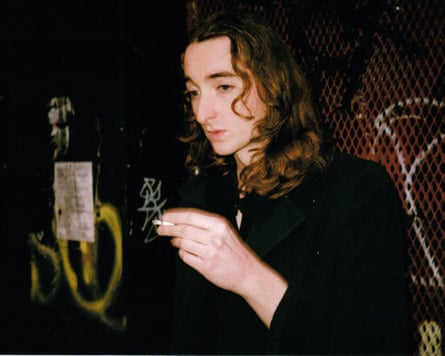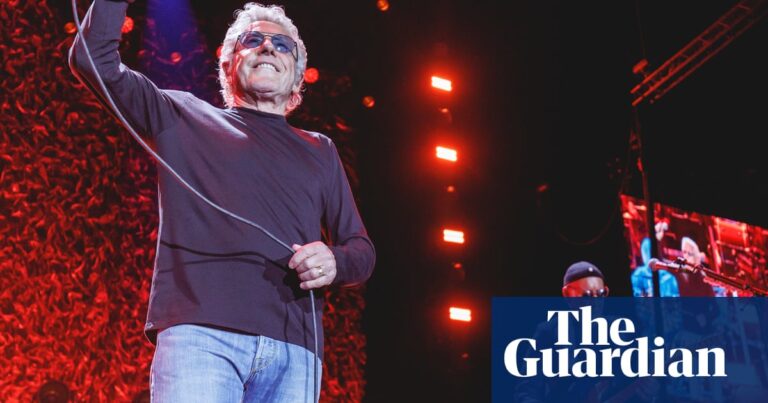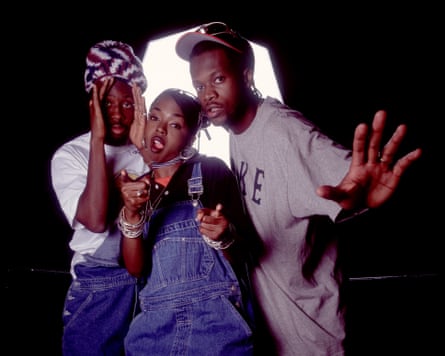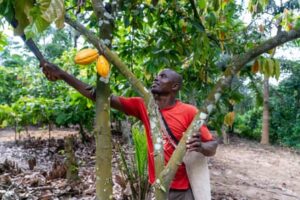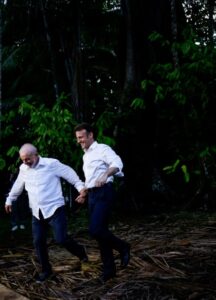Inside a rehearsal space scented with essential oils, a new, unlikely electro-art-pop duo are preparing for their live debut. Called Sam Morton, they are the collaborative pairing of the twice-Oscar-nominated actor, director and writer Samantha Morton and the celebrated producer, songwriter and boss of XL Recordings Richard Russell. Morton, wearing denim dungarees, is singing the fluty, jazzy, bassy, atmospheric Let’s Walk in the Night while Russell, in jeans and a graffitied white T-shirt, hunches over production consoles, alongside a keyboard player and a guitarist.
We are in the Copper House, Russell’s personal studio. It is characterised by an undeniable vibe: a lime-green artwork on a scarlet wall announces “RESIDENCE LA REVOLUTION”; the phrase “FATE IS DECIDED”, alongside descriptions of cloud formations, is chalked on black walls. The tiny bathroom is wallpapered in Buddhist texts and stocked with books, including The Tibetan Book of the Dead.
Russell, evidently, is a sensitive guy. No wonder, when he heard Morton on Desert Island Discs in 2020, that he was moved by her story of the imagined “blue butterfly” that flew out of her body while listening to Suicide’s Dream Baby Dream. Suddenly, much of the grief over her mother’s recent death left her, and Morton felt that “she was still with me, she always was, and she always will be”.
This was a seismic moment for Morton, who grew up mostly in care – her mum’s life blighted by serious mental health issues, her dad a sporadically violent man who served spells in prison. Russell approached Morton, hoping to sample this spoken passage for his collaborative project Everything Is Recorded. A musical partnership developed unexpectedly; today, they call themselves “a synth-pop duo”. But don’t expect any kitchen discos here: their debut album, Daffodils and Dirt, is profoundly melancholy, much of it Morton’s sonic autobiography.
Post-rehearsal, upstairs in the recording studio, Morton, 46, and Russell, 53, sit side by side on a sofa. My first question is about the butterfly story that connected them – but as soon as I ask it, all the harmonious vibes, much like a butterfly, instantly fly out the window.
“I’m not comfortable talking about that, I just love to talk about the music,” Morton tells me, steadily. What follows is 15 minutes of awkward, three-way bewilderment. I ask what fundamentally connects them in spirit; Russell merely suggests: “A way to look at things.” Perhaps, I venture, it is cultural: both were born in the 70s, their careers forged in the maverick-minded 90s, when they were rave enthusiasts and uncompromising DIY spirits. Are they DIY rave punks from the 1990s? Nine seconds pass in startled silence.
Morton: “I definitely wouldn’t describe myself that way. What an extraordinary question!”
“We were both raving though!” hoots Russell. “And we are DIY people.”
Since adolescence, alongside acting, Morton has made music at home, singing and playing piano; in private, she says, “I plonk”. Then Russell offered this “open space”. I wonder if singing is still an acting performance, or if the singer-songwriter is the real her? “Oh, it’s totally a character, absolutely,” she says. “And I don’t think being in character is hiding anything.”
But acting is taking on someone else’s character and singing your own songs isn’t. “Yes, but even the way I act isn’t really performance, it’s being.”
So … it’s as much you when you are being someone else? “No, absolutely not!” she retorts – and now I am laughing out loud. “It’s the Zen of it, you are that. I’m not really Catherine de Medici when I play the Queen of France,” she says, referring to her wonderfully ruthless role in the US TV series The Serpent Queen. “It’s a lie, but I can’t lie when I’m in it. That’s my duty of care … to truth, to life. One might say it’s very close to being mentally very unwell. I have to bring my essence, my soul, into everything I do. Otherwise, I feel a fraud. Otherwise, I can’t breathe.”
By the close of this heartfelt soliloquy, Morton’s curiously irked responses make sense. It’s the first time she has spoken in public about her profoundly personal music; she needs to be understood with crystal clarity, on this as with everything else. It’s something for which she has fought for ever – to not only survive, but to flourish.
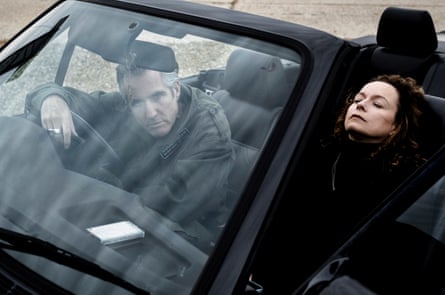
Daffodils and Dirt was created over three years, remotely and in this room, where a sign on the door reads: “No outside realities”. There was no long-term goal. “I didn’t even think it would be in the universe for anyone else to hear,” says Morton. There was no preconceived agenda, in lyrical theme or sound; they merely “flowed”. Her lyrics, searingly honest yet poetically cryptic, often scenes from her painful childhood, were written over Russell’s foreboding sonic sorcery, recorded as ethereal singing and grave spoken word. Purple Yellow is a claustrophobic reflection on Morton’s parents: “My father, the martyr, the liar, the user, the joker, the reaper / Oh and my mother / Swallowing the night air / Fizzing of the nightmare / Eyes of the beast stare / Bouncing in my Nike Air.”
The trumpeting, lilting dreamscape of Broxtowe Girl, which Morton calls an “uplifting song”, describes rioting in Red Tiles children’s home in Nottinghamshire and listening to UB40 (it features UB40’s Ali Campbell on vocals), with affectionate flashbacks to living with her dad, in brief spells of stability, on Broxtowe council estate. Double Dip Neon is a drum‘n’bassy ode partly to ecstasy. The Shadow is a menacing, sonic Grimm’s fairytale about a child addressing a predatory shadow: “She told it she forgave it / And she allowed it to hurt her / Smiling through tears and pain / As it ripped apart her flesh.”
A profound sadness permeates these often hypnotically ghostly songs. “I guess music making is a healing thing,” decides Russell. “Who knew? No one gets into music thinking: ‘Oh, this’ll be healing!’ But it turns out that it is.”
“This was creative rebirth for me,” nods Morton. “All art is healing. I feel like we’re in the business of wellbeing.”
Throughout her 30-year career, Morton has worked with a spectrum of movie giants, from Woody Allen (Sweet and Lowdown, in which she played Sean Penn’s mute lover, an Oscar-nominated performance) to Steven Spielberg (Minority Report) and Darren Aronofsky (The Whale). This year, she received the Bafta Fellowship, the academy’s highest honour, which she dedicated to kids in care, ending her emotional acceptance speech with: “Don’t let the bastards grind you down!” Her achievements are made all the more remarkable for the lack of privileged leg-up prevalent across the arts today: recent research by Labour showed that nearly half of UK award nominees in the past decade were privately educated.
Morton’s backstory reads like the grim social realism of Ken Loach. Both her parents had poor mental health: her beloved mum given to breakdowns; her dad also much loved, despite the “good hidings” he would administer to Morton and her two older sisters. Her parents split when she was two and she gained six half-siblings through her parents’ subsequent relationships. (Her stepdad also spent time in prison.)
Moving constantly between children’s homes and foster homes, she endured bullying, cruelty and violence; she was sexually abused by two male residential care workers (once simultaneously) and witnessed widespread abuse of her friends. She was run over by cars several times, fought playground bullies at school, got expelled, ran away from homes, slept rough, shoplifted to order and was often arrested.
Acting allowed her to transcend those hardships. Having excelled at the Central Junior Television Workshop from the age of 13, at 16 she headed to London. She was soon a fledgling TV actor, playing a teenage sex worker in Band of Gold, where she says she gained a “difficult” reputation for refusing inappropriate nudity requests, objections that she would be applauded for making today.
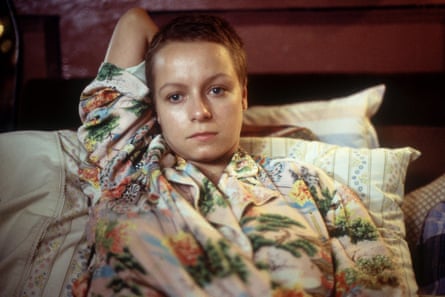
When she was 30, a ceiling in her 17th-century home collapsed on her head, damaging her vertebral artery, causing two strokes – she had to learn how to walk and talk again. For years, she endured severe endometriosis and was told she would never have kids. Defiantly, she had three, now 24, 16 and nine, the younger two with her film-maker husband, Harry Holm).
“I was determined endometriosis wouldn’t ruin my life and so I accepted it,” she says. “And the minute you accept things – pain: emotional, physical – it’s the waves of the sea: we go in, it’s lovely, then stormy, and you breathe with it. My big thing is acceptance – accepting the realities of being human. And some of these experiences have gone into the music and performances and me growing into the human being, friend, mother, wife, Sam that I am.”
Russell and I probe her as to where this strength comes from. Morton suggests a life constantly surrounded by new and different people, her empathic nature – that “someone’s always got it tougher” – and her lifelong Christian faith.
“I also think, with the advent of social media, we’re living in the time of me,” she says. “How do I feel, how that’s gonna affect me. I grew up in the time of we. My brothers and sisters, we will get through this. In the children’s home, we were being abused, not I. I didn’t take any of it personally. It wasn’t my fault. I never felt sorry for myself. Never.”
“Not taking it personally, that’s extremely highly evolved thinking,” Russell tells her. “That’s the essence of Buddhism, to see that it’s not really about you.”
“My nickname growing up was Bubbles,” Morton says, then laughs. “After Michael Jackson’s monkey. Because I was always full of beans! And I always forgave. My faith made me feel that everybody deserves to be loved. From a very young age, love’s the way. Love everyone. I don’t feel hate.”
Russell has survived his own life-changing traumas. By the late 90s, after the Prodigy album The Fat of the Land had reached No 1 across the world, XL had become one of the most successful independent record labels on Earth, even before it signed Adele. Russell, a teenage hip-hop obsessive whose career began working in record shops, was overwhelmed, suffered an identity crisis and experienced depression. In 2013, he developed a rare autoimmune disorder, Guillain-Barré syndrome, leaving him paralysed and in severe pain, enduring a lengthy recovery. I ask how he navigated these crises. A full 17 seconds pass in thoughtful silence.
“The physical illness was not as bad as real depression, a much more alone experience,” he says, eventually. “In my late 20s, which happens to a lot of men, you don’t really know yourself. Boys don’t talk about emotional stuff. When a friend suggested I get help, it was: ‘What? I’m not mad!’ But there is progress now.”
His seven years of therapy prepared him for enduring his physical illness. He remembers lying in hospital, paralysed, but at peace. “I just thought: ‘This is what we’re doing now, I’ve got no choice.’ I was pretty cheerful through that whole thing.” He emerged with a fresh appreciation of the most vital aspect of his working life. “Freedom,” he says. “It’s really fucking hard to maintain a life in music and I’ve realised, through working with other people, with Sam, it’s not just the doing it, but doing it with freedom. I had to fight for it, but I have a lot. Not everybody does, so I need to do good things with it. Things that mean something.”
For the past 25 years, the similarly freedom-fighting Morton has been doing things that mean something, as a campaigner for the NSPCC and social service funding whose “lifetime goal” is to make corporal punishment a crime. “And ending violence towards children globally,” she adds. “I’ve got to keep hammering these points. We live in times where people think it’s important what Kim Kardashian wears. It’s fucking nuts. We’re living in ridiculous times!”
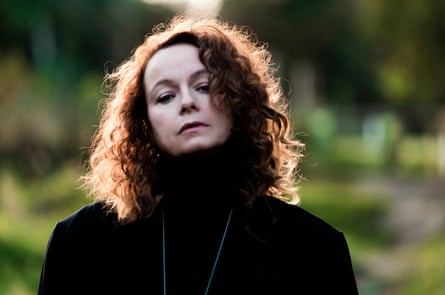
She fumes some more over government cuts to libraries – “the minute you deprive a human being of words and books, it’s all dark” – and the loss of state school drama and music departments. “Nobody’s gonna think that drama or music is a possibility for them if there’s no drama teachers or no instruments in schools,” she says. At her old school, West Bridgford, “there were rooms full of keyboards. I think there is next-level evil going on. It’s dark days, but out of that, amazing things will happen. Creativity will always rise to the top.”
Is she fairly hopeful, then, for beleaguered generation Z, with their often stressed-out, apocalyptic worldview? “There’s a lot of pressure on them, technologically, financially,” she says. “It’s tougher for kids in care today than it was for me – homelessness, poverty, all those things that I identify with are tougher.”
Suddenly, she smiles broadly. “But we’re talking in spring. There is always rebirth,” she says. “The sun will always shine. And we can set an example to those young people: stay optimistic, stay positive, stay strong, be that freedom fighter.”
We head back downstairs and the pair see me out the front door. “The sun’s out!” beams Morton, staring at blue skies overhead after endless days of grey. “There will be daffodils.”
Source: theguardian.com









